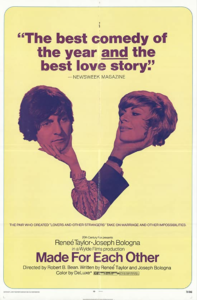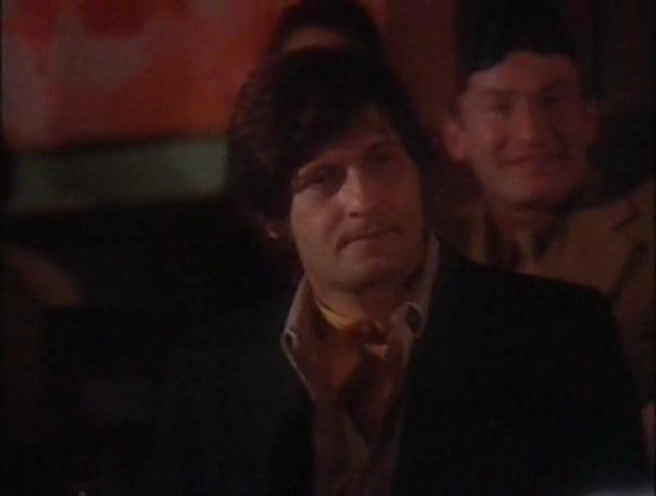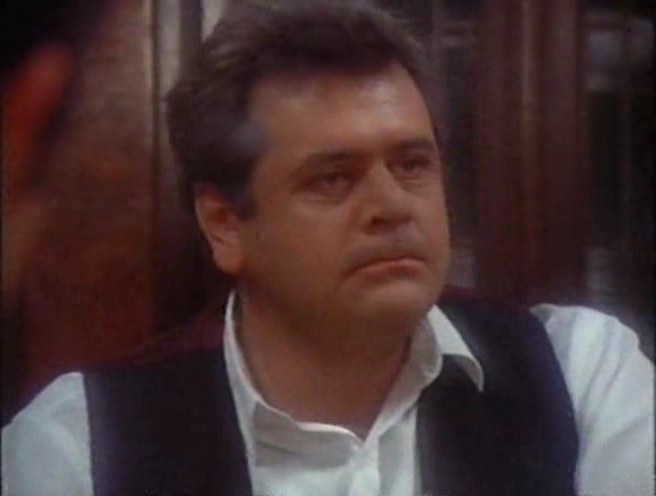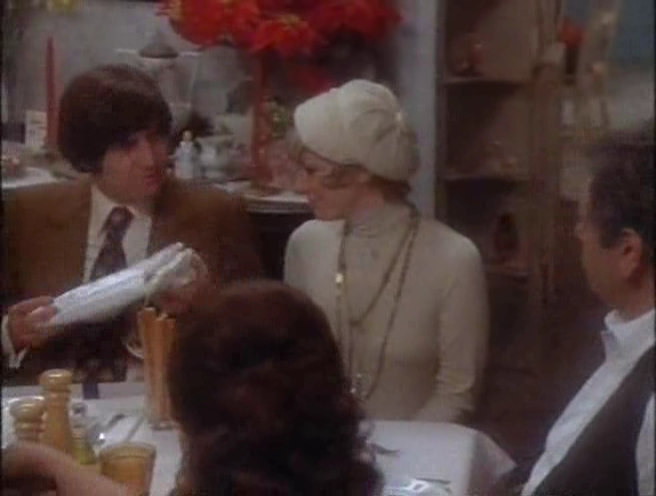“That’s why Gig and I are so good for each other: We’re two self-destructives confronting the life source.”
|

Synopsis:
A neurotic Jewish woman (Renee Taylor) and a womanizing Italian (Joseph Bologna) meet at a group therapy session and fall tentatively in love.
|
|
Genres, Themes, Actors, and Directors:
- Cross-Cultural Romance
- Romantic Comedy
Response to Peary’s Review:
Peary’s review of this “brutally insightful” romantic comedy by husband-and-wife team Joseph Bologna and Renee Taylor is spot on: he notes that while the “picture starts out awkwardly”, you should “stick with it because you’ll be rewarded” by scenes that “you may have seen previously only in your own life — never on the screen”. Indeed, it possesses a surprising number of “exceptional scenes… filled with pain and humor” — as Peary notes, it’s likely that “only an acting couple who are really in love and trust one another would dare play such emotionally devastating sequences” (and it’s especially heartwarming to know that they’re still together, in real life, after 40 years of marriage). At times, Taylor and Bologna’s script goes for laughs that are a little too obvious and easy (i.e., most of the initial group therapy scene) — yet slowly but surely, they allow their (semi-autobiographical?) characters to delve mercilessly into the flaws and neuroses that so often tear couples apart, and a surprising amount of honesty emerges. I’ll admit I didn’t expect myself to be so enmeshed in these characters’ fates by the film’s undeniably powerful ending.
Redeeming Qualities and Moments:
- Renee Taylor as Pandora

- Joseph Bologna as Gig

- Fine supporting performances

- A surprisingly smart and insightful screenplay

Must See?
No, but it’s certainly recommended, if you can locate a copy.
Links:
|
2 thoughts on “Made For Each Other (1971)”
Slight spoiler at the end of this…
A must-see – for reasons brought out in the assessment (!).
This movie is, indeed, awkward – from beginning to end, and that is its strength. I don’t mean that the film is at all badly made, but that the sensation of human awkwardness permeates.
We are introduced to the main characters by way of how they came to be born. In other words, we ‘meet the parents’ – which will eventually explain (as, indeed, Taylor explains to Bologna’s family upon meeting them – in the film’s best sequence, the New Year dinner) why not only Pandora and Gig are damaged but so are tons of people who attempt relationships without cleaning their emotional houses first.
I can’t say I agree with Peary re: the enhanced level of trust that Taylor and Bologna must have placed in each other to play such “emotionally devastating sequences”. It’s not as if this is ‘Who’s Afraid of Virginia Woolf?’, which is infinitely more savage (even today) in its portrait of coupling (and, during which, Burton and another Taylor were married). Yes, there is a certain rawness in ‘MFEO’ but there is also a lot of compassion in the way this progression of love develops. And, throughout, we care about these two people – in a way we may not in other urban love stories (i.e. some of Woody Allen’s superficial ‘love’ tales). We somehow keep wanting Pandora and Gig to beat the odds and succeed with each other.
Although the film appears more like a series of vignettes, the scenes (often quite funny, with throw-away comic dialogue) are nicely structured into a whole and nothing comes off as extraneous. (I could probably point out many favorites, but one in particular is a flashback scene in which Bologna’s parents visit him at college: Bologna gets irritated when his father refers to ‘African Studies’ as ‘Colored People Studies’ and starts railing about how “We don’t want any favors from Honky!”)
Director Robert B. Bean (who apparently never made another movie – could this really be a real person? Bob B. Bean?) does get fine performances from all throughout but I esp. like the underrated Paul Sorvino as Bologna’s dad; he takes every opportunity (with his face and his timing) to lift the role up and out of caricature.
The film’s end is perhaps one of the finest I’ve ever seen for a love story and, quite honestly, makes the entire film a must. A very emotional showdown between Taylor and Bologna leads to his final, heartbreaking cry: “I have to love you!” – a statement left unexplained but which drips with subtext.
This showed up on the FX Movie channel a little while back, and since I have YouTube TV it was getting ready to expire in a couple of days (since I have a 9 month cloud DVR).
I bring this up because I wasn’t really looking forward to watching it. Frankly, parts of it were unbearable. Or were they?
Some spoilers…
Bologna and Taylor had chemistry which makes sense since they were married. Successfully married right up to Bologna’s death. That says a lot to me, and it makes their performances and screenplay more compelling than I could imagine.
I could have done without some of the therapy session – this could have been handled better.
And some of the “wining” and ethnic stereotypes grated a little. Yet, this played into a little of what made the two who they were.
The early scenes in the 30’s were awkward, but seeing that Giggy’s parents were played by Paul Sorvino and Olympia Dukakis was fun (Pandora’s parents were less memorable – especially the cheating father).
One kept wondering what these two saw in each other. Giggy being brutally honest about Pandora’s stage show was doomed to failure, but the immediate aftermath showed they had a connection (his failed attempt at “infidelity” and her realization that her act was pretty bad).
And the New Years’ Day dinner scene – for one brief moment I was happy Gibby’s father stood up for his son…only to realize that he was just as bigoted. It showed Gibby would have none of that.
Of course the aborted breakups happened repeatedly, but the final moment of the film spoke loudly (as has been mentioned here).
Early 70 films dealing with relationships can be very dated, and this was in its own way. With that said, I’m happy I stuck with it. Is it a must see? Not sure, but if it comes around somewhere give it a try.